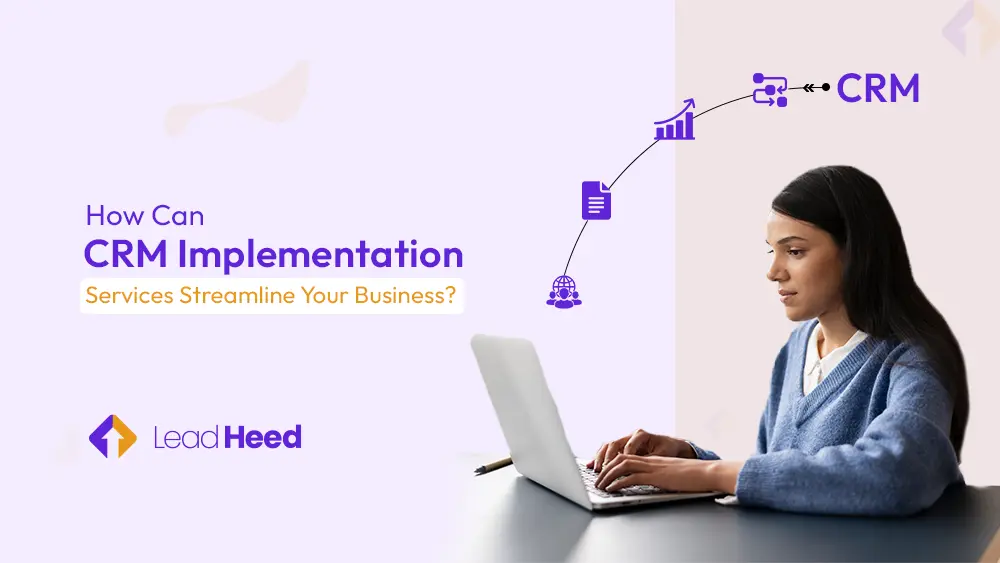If a CRM is set up the wrong way, it can confuse employees, break workflows, and lower productivity. Instead of helping, it ends up creating more problems, wasting money, and slowing business growth.
That’s where CRM implementation services come in to make the process easier. They guide you through setup, customization, and integration so you get the best results from your CRM. With expert help, your system becomes easier to use, saves time, improves teamwork, and supports business growth.
This blog highlights how CRM implementation services simplify processes, maximise efficiency, and drive better business outcomes.
What are CRM Implementation Services?
CRM implementation services are the structured steps taken to set up and install a CRM system so it works for your business. It’s not only about adding new software—it’s about making sure the CRM matches your business goals, processes, and team needs.
These services include planning, customization, training, and ongoing support to help you get real value from your CRM. Without proper implementation, even the best Customer Relationship Management software can fail to deliver results.
Usually, expert consultants, CRM vendors, or specialized agencies provide these services. They guide you through setup, connect the CRM with your existing tools, and train your staff to make adoption smooth and effective.
Why Do Businesses Need CRM Implementation Services?
Businesses need CRM implementation services to avoid failed rollouts, ensure smooth adoption, customize workflows, and handle data migration and CRM integration. These services help your team use the CRM effectively, boost productivity, and get the most value from your investment.
1. Avoiding failed CRM rollouts
Many businesses underestimate the complexity of CRM implementation. A poorly executed rollout often leads to low usage, frustrated employees, and wasted budget. Professional services guide you through the process step by step, ensuring a smooth launch and higher return on investment.
2. Ensuring smooth adoption and user training.
Your CRM is only as good as the people using it. Implementation experts provide clear training, practical onboarding, and ongoing support. This ensures your team understands the system and actually benefits from it in their daily tasks.
3. Customization for unique business processes.
Generic CRM setups rarely fit every workflow, leading to inefficiencies. With implementation services, the CRM is tailored to your needs, whether it’s building custom sales pipelines, automating repetitive tasks, or aligning reports with your KPIs.
4. Better data migration and integration with existing tools.
CRM setup processes assist in moving existing customer data into the new system without losing quality. Expert services handle data migration carefully, cleaning and organising data before importing it. They also connect your CRM with tools like email, accounting software, or ERP, so your team works from one unified system.
Key Components of CRM Deployment Services
CRM deployment services include assessing needs, selecting the right system, customizing workflows, migrating data, training users, and monitoring performance. These steps ensure a smooth setup and long-term success for your business.
1. Needs assessment and CRM selection
The first key component of CRM deployment services is needs assessment and CRM selection. Before choosing a CRM, experts evaluate your business goals, processes, and challenges. This ensures you select the right platform, one that matches your size, industry, and your future growth needs.
2. Strategic planning and customization
This component of implementation services maps out a clear strategy and tailors the CRM with custom fields, automation rules, and dashboards. This enables it to work exactly the way your team does.
3. Data migration and integration
Data is the backbone of a CRM. Professionals clean, organise, and migrate your existing customer information into the new system while ensuring no valuable records are lost. They also integrate the CRM with tools like ERP, email, or marketing platforms for seamless operations.
4. User training and support
The success of your CRM depends on user adoption. Implementation teams provide hands-on training, documentation, and ongoing support to help employees use the system confidently and effectively.
5. Deployment, monitoring, and optimization
Finally, deployment, monitoring, and optimization are crucial components of implementation services. Once live, the CRM needs continuous monitoring. Experts track performance, troubleshoot issues, and optimize workflows over time, ensuring the system evolves with your business.
Benefits of CRM Implementation Services
CRM implementation services boost adoption and CRM ROI while organising customer data and reducing errors. They also scale with growth, support data-driven decisions, and strengthen customer relationships for long-term success.
1. Faster adoption and higher ROI
With proper implementation, your team can quickly learn and start using the CRM. Faster adoption means employees understand the new system right away, instead of struggling with it. This saves time, reduces frustration, and helps your business see results sooner. As a result, you gain a higher return on investment with better productivity, stronger sales, and improved customer management.
2. Better customer data management
CRM implementation services ensure all customer data is organised, accurate, and easily accessible. Clean data eliminates duplicates, reduces errors, and helps your team find information quickly. With structured and reliable data, you can track interactions effectively, analyse customer behaviour, and make better decisions that improve overall business performance.
3. Fewer implementation errors and downtime
Implementing a CRM without expert guidance leads to mistakes, system errors, or downtime. Implementation services help prevent these issues through careful planning, testing, and step-by-step deployment. This ensures a smooth transition, keeps your business operations running uninterrupted, and avoids costly delays or disruptions during the setup phase.
4. Scalable for future growth
A professionally implemented CRM grows with your business. Implementation experts set up scalable workflows, automation, and dashboards that can handle increasing users, data, and processes. This flexibility ensures that the CRM continues to support your operations efficiently as your business grows.
5. Smarter, data-driven decisions
An expert CRM setup gives you stronger CRM reporting and analytics. This means you get useful insights about your customers, sales, and daily operations. You can track performance, spot trends, and make smarter decisions using real data. This data-driven approach helps improve strategies, boost efficiency, and drive growth across the business.
6. Enhanced customer relationships
A well-implemented CRM helps you understand your customers better and respond to their needs faster. Personalised interactions, timely follow-ups, and organised communication build trust and loyalty. Over time, this strengthens customer relationships, improves satisfaction, and encourages repeat business. As a result, it boosts long-term revenue and brand reputation.
Common Challenges in CRM Implementation (and How Services Solve Them)
CRM implementation comes with challenges that can affect adoption, efficiency, and overall success of your CRM. Common issues include data migration problems, low employee adoption, over-customization and complexity, and lack of ongoing support. Expert services address these challenges, ensuring smooth setup, consistent use, and long-term CRM effectiveness.
1. Data migration issues
Moving your customer data from old systems to a new CRM is more complicated than it seems. One small mistake can mean missing records, duplicate entries, or even corrupted data. Many businesses underestimate the time and effort required to clean and prepare data for migration. This results in poor data transfer, affecting reporting, customer interactions, and overall CRM performance.
Solution: CRM experts carefully clean, validate, and securely transfer all data. They test the migration in stages, ensuring nothing is lost and all your information remains accurate. This guarantees your teams start using the new CRM confidently and avoid costly mistakes later.
2. Low employee adoption
Your CRM is valuable only when your team actually uses it. If the system feels confusing or unfamiliar, employees may avoid it. This low adoption results in weak reporting, wasted investment, and a CRM that never reaches its full potential.
Solution: Implementation specialists create user-friendly CRM setups and give hands-on training to your team. With ongoing support and clear guidance, employees feel confident using the system. This encourages regular use, improves teamwork, and boosts overall productivity.
3. Over-customization and complexity
Trying to implement every feature immediately can overwhelm your team. Too much customization slows workflow efficiency and makes the system harder to maintain or upgrade. Businesses risk paying for features they don’t need, creating unnecessary complexity and confusion.
Solution: Experts focus on the features that matter most to your business. They implement workflows, dashboards, and automation gradually, keeping the CRM easy to use, efficient, and flexible enough to grow with your company.
4. Lack of ongoing support
Once a CRM is live, businesses may face challenges with troubleshooting, updates, or adjusting the system as needs change. Without proper support, minor problems can disrupt workflows, frustrate staff, and reduce overall productivity.
Solution: Experienced providers offer continuous monitoring, handle updates, and resolve issues quickly. They also advise on optimizations and improvements, ensuring your CRM remains effective and continues to support growth.
How to Choose the Right CRM Implementation Partner?
Choosing the right CRM partner ensures a smooth setup and maximum value from your system. Focusing on clear goals, budget, usability, integration, customization, team involvement, testing, and reliable support helps make the best choice.
1. Define your business goals
Before choosing a partner, you should be clear about what you need in your business. Do you want to shorten response times, improve customer retention, or get better visibility into your sales pipeline? Defining these outcomes in advance helps your implementation partner align the CRM setup with your priorities. Planning in advance actually aids in achieving measurable results instead of vague improvements.
2. Set a realistic budget
Determine how much you can spend on CRM software, implementation, and ongoing support. A clear budget prevents overspending and ensures the project remains manageable. It also helps you prioritise which features are most important and identify partners who can work within your financial constraints while still delivering quality results.
3. Evaluate core features
Check if the partner can implement all essential features your business requires, such as reporting, automation, lead tracking, and customer management. Ensuring the partner understands your workflow allows them to configure the system correctly. This step prevents gaps in functionality and ensures your CRM supports all critical business processes effectively.
4. Prioritize usability
A CRM that is intuitive and easy to use encourages higher adoption across your team. Overly complex systems can slow productivity and require extensive training. Your partner should focus on designing user-friendly dashboards, workflows, and interfaces so employees can use the CRM confidently from day one.
5. Check integration capabilities
Verify that the CRM can integrate with your existing tools, including email, ERP systems, marketing platforms, and other business software. Smooth integration avoids duplicate work and ensures data flows seamlessly between systems. An experienced partner will handle these connections, allowing your CRM to fit naturally into your current operations.
6. Consider customization and scalability
The partner should tailor the CRM to your unique business processes and ensure it can scale as your company grows. This includes configuring workflows, dashboards, and automation that match your operations. A scalable solution ensures you won’t need to replace your CRM as your team or data volume expands.
7. Test before committing
Always request demos, trial periods, or sandbox environments to verify the CRM meets your needs. Testing allows you to explore usability, performance, and functionality firsthand. It also helps identify potential issues before full deployment, reducing risks and ensuring the system will deliver value once fully implemented.
8. Involve your team
Include key users from sales, marketing, and support in the decision-making process, including feedback on usability, required features, and workflow compatibility. Early involvement ensures better adoption, identifies potential challenges, and helps the partner configure the system to match how your team actually works.
9. Assess vendor support
Ensure the partner offers ongoing support, training, and updates after deployment. Reliable support helps resolve issues quickly, guides new features, and ensures the CRM remains effective as your business needs evolve. A partner committed to long-term support maximises your investment and keeps your system running smoothly.
Conclusion
CRM implementation services make setup smooth, boost user adoption, and create workflows that fit your business. They also handle data migration, tool integration, and smarter decision-making. This helps you avoid mistakes, improve ROI, and build stronger customer relationships.
That’s why at LeadHeed, we offer complete CRM implementation services designed to solve real challenges like scattered data, low adoption, and workflow issues. From setup and customization to training and ongoing support, we ensure your CRM is easy to use, effective, and grows with your business. With LeadHeed by your side, your team can focus on what matters most—growth, customer satisfaction, and measurable results.
|
Get your CRM set up right with LeadHeed, boost productivity, adoption, and growth. |
FAQs
What do CRM implementation services include?
They typically cover requirement analysis, CRM selection, system customization, data migration, integration with existing tools, user training, and ongoing support. The goal is to ensure the CRM works seamlessly for your business.
How long does CRM implementation take?
The timeline varies by business size and complexity. Small setups take a few weeks, while larger, customized implementations take several months.
What’s the average cost of CRM implementation services?
Costs depend on the CRM platform, level of customization, number of users, and support needs. On average, small businesses might spend a few thousand dollars, while enterprise-level projects can cost significantly more.
Can small businesses benefit from CRM implementation services?
Yes. With expert implementation, small businesses can streamline sales, improve customer relationships, and compete with larger companies by making the most of their CRM investment.



